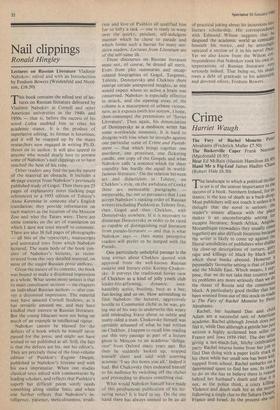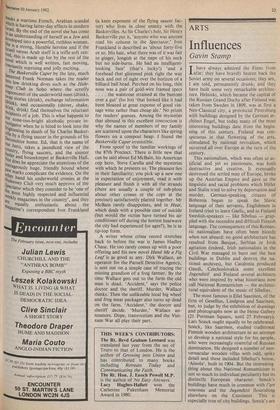Crime
Harriet Waugh
The Fury of Rachel Monette Peter Abrahams (Frederick Muller £7.50) The landscape in which a political thriller is set is of the utmost importance to tile success of a book. Northern Ireland, for itl" stance, is the kiss of death as a back-drop' Most publishers will not touch it unless it is thought that the novel is serious; the reader's uneasy alliance with the place makes it an uncomfortable setting 1°', escapist literature. South Africa, Aug°113' Mozambique (nowadays they usually come together) are also difficult locations because the writer is likely to come up against the liberal sensibilities of publishers who dislike the close-up descriptions of torture, g°1,.Y rape and killings of black by black with which these books abound. However a, perennially favourite setting is that of Israel and the Middle East. Which means, I WC", pose, that we do not take that country and its problems any more seriously than we °lc; the threat of Russia and the comma-is' block. A particularly good thriller that has been wrested from out of this stock-in-trade is The Fury of Rachel Monette by Peter Abrahams. Rachel, her husband Dan and child Adam are a successful unit of American academe. Rachel although Jewish does not feel it, while Dan although a gentile has just written a highly acclaimed best seller 011 France and Jews 1939-1945. The day after giving a not-much-fun, bitchy celebration party Rachel returns home from her job to find Dan dying with a paper knife stuck his chest while her small son has been kid- napped from school. Rachel embarks on a determined quest to find her son. In order to do so she has to believe there is reason behind her husband's death and that it it not, as the police think, a crazy killing' Violence and death stalk her as she Moles following a single clue to the Sahara Desert, France and Israel. In the process she 011" tasks a wartime French, Arabian scandal Which is having latter-day effects in modern ,k5rael. By the end of the novel she has come Tan understanding of herself as a Jew and She into a powerful, ruthless woman. 'he is a strong, likeable heroine and if the Israeli versus Arab stuff is a trifle soft cen- tred, this is made up for by the rest of the novel which is well written, fast moving, constantly suprising and jolly exciting. The Baskerville Caper by the late, much lamented Frank Norman takes the reader lilt° low drinking dives such as the Hide- 40.1, Club in Soho where the scruffy cognoscenti of the underworld meet (drink), sway stories (drink), exchange information (dank), and occasionally (shiver, shake, drink, drink) find themselves the reluctant 71Pients of a job. This is what happens to
uor i
. none-too-bright alcoholic private n- ve.srigator when he is hired to look into the tightening to death of Sir Charles Basker- ille by a flying saucer in the grounds of his Devonshire home. Ed, that is the name of °cur hero, takes a jaundiced view of. the k°1111rrY, flying saucers, and the sinister butler and housekeeper at Baskerville Hall. 0r does he appreciate the attentions of the outrageously huge, friendly hound whose paw marks complicate the evidence. On the /Per hand his underworld cronies at the SsideawaY Club very much approve of the pectator which they consider to be 'one of we most highly respected and influential a eeklY magazines in the country', and they re equally enthusiastic about the magazine's correspondent Ivor Frankland (a keen exponent of the flying saucer fac- tor) who lives in close enmity with the Baskervilles. As Sir Charles's heir, Sir Henry Baskerville put it, 'anyone who was anyone read his column in the Spectator.' Ivor Frankland is described as 'about forty-five or so. His hair, what there was of it was fair to ginger, longish at the nape of his neck but no side-burns. He had an intelligent- looking face' (that's lucky!) 'and a forehead that glistened pink right the way back and out of sight over the horizon of a billiard ball head. Perched on his long, thin nose was a pair of gold-wire framed specs . . . the waistcoat strained at the buttons over a gut' (ho ho) 'that looked like it had been bloated at great expense of good vin- tage wine rather than cheap ale.' No prizes for readers' guesses. Among the mysteries that abound in this excellent concoction is why the names of members of my family are scattered upon the characters like spring flowers on a compost heap. I found the Baskerville Caper irresistible. From spoof to the familiar workings of the 87th Precinct. There is little new that can be said about Ed McBain, his American cop hero, Steve Carella and the mysteries with which he presents us. The pleasure lies in their familiarity; you pick up a new one in expectation of enjoyment, read it with pleasure and finish it with all the strands (there are usually a couple of sub-plots about other crimes or the cops at the precinct) satisfactorily platted together. Mr McBain rarely disappoints, and in Heat, which deals with a possible case of suicide (but would the victim have turned his air conditioner off during the hottest heatwave the city had experienced for ages?), he is in tip-top form. A writer whose crime record stretches back to before the war is James Hadley Chase. He too rarely comes up with a poor offering and his new novel Hand Me a Fig Leaf is as good as any. Dirk Wallace, an operator for the Parnell Detective Agency, is sent out on a simple case of tracing the missing grandson of a frog farmer. By the time Wallace gets out to the farm the old man is dead. 'Accident,' says the police doctor and the sheriff. Murder, Wallace thinks. Then the unlikeable local big wheel and frog meat packager also turns up dead on the farm. `Accident,' the doctor and sheriff decide. 'Murder,' Wallace an- nounces. Dope, transvestism and the Viet- nam War all play their part.



































 Previous page
Previous page